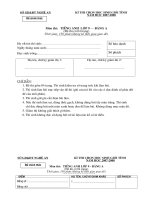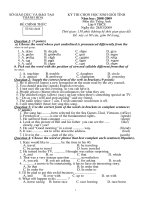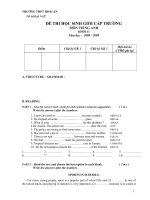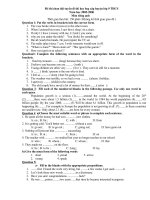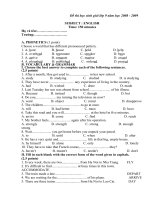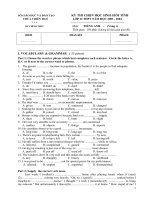- Trang chủ >>
- THPT Quốc Gia >>
- Sinh học
De thi HSG Anh 9Tinh0304
Bạn đang xem bản rút gọn của tài liệu. Xem và tải ngay bản đầy đủ của tài liệu tại đây (109.21 KB, 4 trang )
<span class='text_page_counter'>(1)</span><div class='page_container' data-page=1>
<b>SỞ GIÁO DỤC-ĐÀO TẠO</b>
<b>VĨNH PHÚC</b> <b>KỲ THI CHỌN HỌC SINH GIỎI LỚP 9-THCS<sub>NĂM HỌC: 2003- 2004</sub></b>
<i><b>Đề thi môn: Tiếng Anh</b></i>
<i><b>Thời gian làm bài: 150 phút (Không kể thời gian giao đề)</b></i>
<b>( Đề thi này có 04 trang)</b>
<i><b>Câu I- Trong mỗi câu, chọn từ có phần gạch chân có cách phát âm khác với những</b></i>
<i><b>từ cịn lại.</b></i>
1. A. poor B. four C. door D. course
2. A. days B. says C. ways D. plays
3. A. thank B. month C. than D. youth
4. A. pull B. input C. food D. good
5. A. noon B. soon C. moon D. book
<i><b>Câu II- Chọn từ hoặc cụm từ đúng điền vào các câu sau đây.</b></i>
1. “I’ll call _________you at 6 o’clock,” said James.
A. by B. up C. for D. in
2. If you require any more _________about the holiday, please telephone us.
A. description B. information C. news D. fact
3. A copy of our spring brochure is _________with this letter.
A. combined B. attached C. delivered D. enclosed
4. Too much exercise can be harmful but walking is good _________you.
A. for B. by C. to D. with
5. The salesman showed us _________the washing machine.
A. for using B. how to use C. the working of D. to work
6. This ticket _________one person to the museum.
A. permits B. admits C. enters D. allows
7. We had _________reached the church when we saw everyone leaving.
A. quite B. enough C. rather D. almost
8. Traveling to Paris _________air is quicker than driving.
A. by B. on C. over D. through
9. On holiday I _________always on the beach when the weather is fine.
A. am B. was C. were D. be
10. Is it far too hot today for you _________the garden.
A. to dig B. digging C. for digging D. have dug
11. “Thank goodness you have come, _________!” she exclaimed in relief.
A. finally B. at the end C. lastly D. at last
12. Our neighbors _________their hedge cut once a year.
A. make B. do C. have D. fix
13. It was a magnificent car which must have belonged to a very _________person.
A. plentiful B. wealthy C. expensive D. luxurious
14. Heavy snowfalls have _________all trains.
A. cancelled B. postponed C. delayed D. omitted
15. Susan _________visits her grandmother every Wednesday.
A. often B. usually C. ever D. sometimes
16. This is a challenging position in the car industry for a qualified _________.
A. engineer B. engine C. mechanical D. machinery
17. His first novel was much more exciting _________any he has written since.
</div>
<span class='text_page_counter'>(2)</span><div class='page_container' data-page=2>
A. to B. as C. so D. than
18. Jane and Margaret _________to live next door to each other at one time.
A. have used B. used C. were used D. have used
19. There is a car-park _________to the station.
A. across B. by C. close D. right
20. There was _________enough cake for all of us to have a very small slice.
A. just B. quite C. really D. hardly
<i><b>Câu III- Chia động từ trong ngoặc đơn ở thì thích hợp.</b></i>
1. My school (be) _________finished by the end of 2007.
2. I remember (wake) _________up one night and (see) _________the switch on fire. It
was lucky that I did. If one of us (not wake) _________up, we (kill) _________.
3. The progress (make) _________by our class last month surprised our parents.
4. I (have) _________my house (paint) _________. That’s why there is all this mess.
5. It’s the first time he (drive) _________a car so he (feel) _________nervous.
<i><b>Câu IV- Viết lại các câu sau sử dụng từ 2 cho đến 5 từ, bao gồm cả từ cho sẵn.</b></i>
<i><b>Khơng thay đổi dạng thức của từ đã cho.</b></i>
<i>Ví dụ:</i> I last saw him at my 21st<sub> birthday party.</sub>
<b>since</b> I ______________________my 21st<sub> birthday party.</sub>
<i>Trả lời:</i> I haven’t seen him since my 21st<sub> birthday party.</sub>
1. “You’ve broken my radio, Frank!” said Jane.
<b>accused</b> Jane ______________________her radio.
2. My car really needs to be repaired soon.
<b>must</b> I really ______________________repaired soon.
3. Susan regrets not buying that house.
<b>wishes</b> Susan ______________________that house.
4. I could never have succeeded without your help.
<b>you</b> I could never have succeeded ______________________me.
5. I thought I might run out of cash, so I took my cheque-book with me.
<b>case</b> I took my cheque-book with me ___________________out of cash.
6. Linda’s plan for a picnic have been spoiled by the weather.
<b>fallen</b> Linda’s plan for a picnic ___________________because of the weather.
7. The bread was too stale to eat.
<b>fresh</b> The bread ______________________to eat.
8. Perhaps Brian went home early.
<b>may</b> Brian ______________________home early.
9. I can’t possibly work in all this noise!
<b>impossible</b> It ______________________work in all this noise!
10. The thief suddenly realized that the police were watching him.
<b>watched</b> The thief suddenly realized that he ___________________by the police.
<i><b>Câu V- Đọc đoạn văn sau và chọn từ đúng điền vào chỗ trống đã được đánh số.</b></i>
</div>
<span class='text_page_counter'>(3)</span><div class='page_container' data-page=3>
In some (6) _________you have to pay if you don’t (7) _________motoring laws
and this can sometimes cost you a lot of money. For instance, you have to pay
immediately if you are stopped by a police office for taking no notice of traffic lights,
speed (8) _________or if you allow children (9) _________the age of twelve to (10)
_________in the front seat of a vehicle.
1. A. include B. make C. mean D. contain
2. A. should B. can C. is D. has
3. A. miss B. hide C. lose D. pass
4. A. that B. those C. their D. them
5. A. once B. example C. general D. fact
6. A. counties B. positions C. ways D. routes
7. A. do B. allow C. obey D. continue
8. A. marks B. spots C. limits D. numbers
9. A. under B. lower C. over D. behind
10. A. follow B. pass C. travel D. wait
<i><b>Câu VI- Điền một từ thích hợp vào mỗi chỗ trống trong đoạn văn dưới đây.</b></i>
In that part of the world, it was snobbish to own an English car. My contact there,
a successful businessman, had decided to prove his success by getting, not (1)
_________an English car, a vastly expensive antique Rolls Royce, (2) _________also a
right- hand drive one. The car had (3) _________to be shipped specially from England.
The instructions were in English, with the instruments in miles rather (4)
_________kilometers, and degrees Fahrenheit (5) _________of degrees Centigrade. My
friend was immensely proud (6) _________it. A real, English Rolls Royce, he said, was
the (7) _________of fashion. His friends, he said, would be green (8) _________envy.
The car arrived, and two days (9) _________we had to make a trip to a town
three hours (10) _________away. We set off in the hot morning sun, getting admiring
(11) _________from people in the street. My friend spoke enthusiastically of his car. It
was (12) _________a pleasure to drive, he said, that he (13) _________not imagine
why everyone (14) _________not by one.
Out (15) _________the open road, we went faster. The air was hot now, and my
friend tried to switch on the air-conditioning. (16) _________he could find a heater. I
told him that, in England heaters were more necessary than air-conditioning. He would
not (17) _________me. He tried all the other switches, but kept returning to the heater.
The outside air, which was already uncomfortably hot and dry, was made (18)
_________hotter, and was blown into the car again and again, he tried the switches.
Again and again a blast of hot air hit us. It was painful to breathe. “I’m sending this car
(19) _________back to the makers,” he gasped! “There’s (20) _________badly wrong
with the air-conditioning!”
<i><b>Câu VII- Đọc đoạn văn sau và chọn câu trả lời đúng cho mỗi câu hỏi sau.</b></i>
Design is the act of making something better. Everything, no matter how
ordinary, has been designed.
That some objects give us no special pleasure or are not fashionable does not alter
fact that somebody decided what they would look like, what they would do and how
they would be used.
</div>
<span class='text_page_counter'>(4)</span><div class='page_container' data-page=4>
Some objects look very good but do not work well. Take the Alessi kettle, with it’s
curved handle and two-tone whistle. It looks very exciting but the handle can get too hot
to touch. Compare this with the familiar Russell Hobbs automatic electric kettle. It has
been in production since the late 1950s, works perfectly and looks good.
Poor designs are easy to find. If you cannot see what is at the back of the kitchen
cupboard without getting down on your hands or knees, that is bad design. If you catch
your sleeve on a door handle, that is bad design. If you cannot understand how to use the
controls on your cooker without searching for the instruction book– and if, when you find
the book, you still cannot work the timing switch, that is unpardonably bad design.
The question is: how, when these kinds of faults are so obvious, have some
designs ever reached our homes?
The answer is that in most cases, bad designs emerge because not enough energy
and time is given to thinking through all the different questions that should be asked
about the product.
Kitchen cupboard makers will say that they are making cupboards as
economically as possible. This kind of “cheapness” is one of the main reasons for the
absence of good design in our homes. To make a cupboard where the shelves swing out
to display the contents when the door is opened is more expensive.
1. What does the passage say that good designers think about?
A. how thing will be used B. what people are used to
C. what is fashionable D. what will influence people
2. Things which are excellently designed
A. work perfectly B. last a long time
C. always get chosen by shoppers D. both work well and look good
3. What was wrong with the Alessi kettle?
A. It was too round. B. It was unreliable.
C. The design was impractical D. The design was old- fashion.
4. In what ways are some cookers badly designed?
A. The handle sticked out too far.
B. It is difficult to find the controls.
C. Using the timing switch is a confusing process.
D. The instruction books have no diagrams.
5. Why do badly designed things get made and sold?
A. They are quicker and cost less to make.
B. Manufacturers pay low wages to designers.
C. Designers do not know enough about manufacturing processes.
D. There are too few good designers.
<b></b>
</div>
<!--links-->
